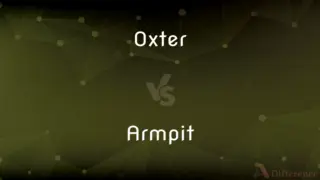Reckon vs. Recon — What's the Difference?
Edited by Tayyaba Rehman — By Fiza Rafique — Updated on March 28, 2024
Reckon is to calculate or conclude, often used in informal contexts, while recon is short for reconnaissance, a military term for gathering information.

Difference Between Reckon and Recon
Table of Contents
ADVERTISEMENT
Key Differences
Reckon is a verb that is commonly used in everyday language to mean calculating, concluding, or considering something in a certain way. For example, one might say they reckon it's going to rain based on the look of the sky. On the other hand, recon is an abbreviated form of the term reconnaissance, which refers to the military activity of sending soldiers or aircraft to gather information about enemy forces or positions. Recon is often used in military contexts but has also found its way into general usage to describe any activity involving the gathering of information, especially in a preliminary or exploratory way.
While reckon is broadly applicable across various contexts, from everyday conversations to business and mathematics, emphasizing personal judgment or estimation, recon specifically denotes an activity aimed at gathering strategic information, often in preparation for military action or in competitive scenarios, such as business or sports. Whereas someone might reckon the outcome of an event based on available data or intuition, recon requires active exploration or investigation to uncover new information.
In its use, reckon can be substituted with synonyms like believe, think, or expect, depending on the context, signifying a more personal, subjective viewpoint. In contrast, recon is more objective and action-oriented, implying a systematic approach to acquiring knowledge, often without directly engaging the subject of interest, to avoid detection or to maintain secrecy.
Despite their differences, both terms imply a form of assessment, whether it be an internal evaluation of facts or opinions in the case of reckon, or an external collection of strategic data in the case of recon. However, the methods, objectives, and contexts in which they are used significantly diverge, reflecting the distinct nature of personal judgment versus tactical information gathering.
Reckon, with its roots in Old English, has a long history in the language, reflecting a deep-seated way of expressing contemplation and judgment. Recon, derived from military terminology, underscores the evolution of language in response to technological and social developments, particularly in how strategic and competitive endeavors are described.
ADVERTISEMENT
Comparison Chart
Definition
To calculate or conclude something; to believe or expect.
Short for reconnaissance, the military term for surveying or gathering information.
Context
Informal conversations, business, mathematics.
Military, strategic planning, competitive intelligence.
Synonyms
Calculate, believe, think, expect.
Surveillance, scouting, intelligence gathering.
Method
Internal evaluation or estimation.
Active exploration or investigation.
Objective
Expressing personal judgment or estimation.
Acquiring strategic information.
Usage
Versatile in everyday language.
Specific to information gathering, often in a preliminary or exploratory phase.
Root
Old English "rekenen" meaning to explain or narrate.
Abbreviation of reconnaissance, from French "reconnaissance" meaning recognition.
Example Context
"I reckon it'll be sunny tomorrow."
"We need to do a quick recon of the area before we proceed."
Compare with Definitions
Reckon
To count or include.
She reckons her blessings every night.
Recon
Military surveillance of a region to locate an enemy.
Aerial recon was conducted over the target area.
Reckon
To calculate or figure out.
Can you reckon the total cost?
Recon
Exploring an area for future activities.
We'll need a quick recon of the hiking trails.
Reckon
To estimate or conclude after consideration.
I reckon we've got enough food for the party.
Recon
Investigating public opinion or market conditions.
They're doing a social media recon to gauge interest.
Reckon
To consider or regard in a certain way.
He's reckoned as a leading expert in his field.
Recon
A preliminary survey to gather information.
The team did a recon of the competition venue.
Reckon
To expect or predict.
I reckon we'll hear from him soon.
Recon
Gathering intelligence about competitors.
Our marketing team is on a recon mission at the trade show.
Reckon
To count or compute
Reckon the cost.
Recon
Reconnaissance.
Reckon
To consider as being; regard as
A book that was reckoned a masterpiece.
Recon
Reconnaissance.
Reckon
To think or conclude
I reckon what you say is true.
Recon
(genetics) The smallest genetic unit that is capable of undergoing recombination.
Reckon
To expect or intend (to do something)
"You reckon to call the sheriff?" (Cormac McCarthy).
Recon
Reconnoiter.
Reckon
To make a calculation; figure.
Reckon
Chiefly South & South Midland To think or believe
I reckon so.
Reckon
To count; to enumerate; to number; also, to compute; to calculate.
Reckon
To count as in a number, rank, or series; to estimate by rank or quality; to place by estimation; to account; to esteem; to repute.
Reckon
To charge, attribute, or adjudge to one, as having a certain quality or value.
Reckon
(colloquial) To conclude, as by an enumeration and balancing of chances; hence, to think; to suppose; -- followed by an objective clause
I reckon he won't try that again.
Reckon
To reckon with something or somebody or not, i.e to reckon without something or somebody: to take into account, deal with, consider or not, i.e. to misjudge, ignore, not take into account, not deal with, not consider or fail to consider; e.g. reckon without one's host
Reckon
(intransitive) To make an enumeration or computation; to engage in numbering or computing.
Reckon
To come to an accounting; to draw up or settle accounts; to examine and strike the balance of debt and credit; to adjust relations of desert or penalty.
Reckon
To count; to enumerate; to number; also, to compute; to calculate.
The priest shall reckon to him the money according to the years that remain.
I reckoned above two hundred and fifty on the outside of the church.
Reckon
To count as in a number, rank, or series; to estimate by rank or quality; to place by estimation; to account; to esteem; to repute.
He was reckoned among the transgressors.
For him I reckon not in high estate.
Reckon
To charge, attribute, or adjudge to one, as having a certain quality or value.
Faith was reckoned to Abraham for righteousness.
Without her eccentricities being reckoned to her for a crime.
Reckon
To conclude, as by an enumeration and balancing of chances; hence, to think; to suppose; - followed by an objective clause; as, I reckon he won't try that again.
Reckon
To make an enumeration or computation; to engage in numbering or computing.
Reckon
To come to an accounting; to make up accounts; to settle; to examine and strike the balance of debt and credit; to adjust relations of desert or penalty.
"Parfay," sayst thou, "sometime he reckon shall."
After a long time the lord of those servants cometh, and reckoneth with them.
Reckon
Expect, believe, or suppose;
I imagine she earned a lot of money with her new novel
I thought to find her in a bad state
He didn't think to find her in the kitchen
I guess she is angry at me for standing her up
Reckon
Judge to be probable
Reckon
Deem to be;
She views this quite differently from me
I consider her to be shallow
I don't see the situation quite as negatively as you do
Reckon
Make a mathematical calculation or computation
Reckon
Have faith or confidence in;
You can count on me to help you any time
Look to your friends for support
You can bet on that!
Depend on your family in times of crisis
Reckon
Take account of;
You have to reckon with our opponents
Count on the monsoon
Common Curiosities
How does the use of "reckon" differ in American and British English?
"Reckon" is widely used in both American and British English, but it may be perceived as more colloquial or characteristic of certain dialects in the U.S.
What skills are important for conducting a recon?
Skills important for conducting a recon include observation, information analysis, stealth, and strategic planning, emphasizing the ability to gather data without attracting attention.
Can "reckon" be used in formal writing?
While "reckon" can appear in formal writing, it's more commonly found in informal contexts and conversational English, where it conveys estimation or opinion.
What does it mean to reckon something?
To reckon something means to estimate, conclude, or consider it in a certain way, often based on personal judgment or available information.
Is "recon" only a military term?
Originally a military term, "recon" has broadened to describe any activity involving preliminary exploration or information gathering in various contexts.
Can "reckon" imply certainty?
While "reckon" often conveys a degree of personal estimation or belief, it can imply a level of certainty depending on the speaker's confidence in their assessment.
How do technologies like drones impact recon activities?
Technologies like drones have significantly enhanced recon activities by providing new means for surveillance and information gathering from a distance, often in real-time and with minimal risk.
What is a recon mission?
A recon mission is an operation aimed at gathering information, typically in a military context, but it can also refer to any strategic exploration or investigation in other fields.
Why is recon important in business?
Recon is important in business for competitive intelligence, helping companies understand market conditions, competitor strategies, and customer preferences to make informed decisions.
What makes a good recon operation in military terms?
A good recon operation in military terms is characterized by accurate, timely, and relevant information gathering that informs strategic decisions without compromising the safety of personnel or revealing intentions to the enemy.
Share Your Discovery

Previous Comparison
Oxter vs. Armpit
Next Comparison
Qualification vs. TitleAuthor Spotlight
Written by
Fiza RafiqueFiza Rafique is a skilled content writer at AskDifference.com, where she meticulously refines and enhances written pieces. Drawing from her vast editorial expertise, Fiza ensures clarity, accuracy, and precision in every article. Passionate about language, she continually seeks to elevate the quality of content for readers worldwide.
Edited by
Tayyaba RehmanTayyaba Rehman is a distinguished writer, currently serving as a primary contributor to askdifference.com. As a researcher in semantics and etymology, Tayyaba's passion for the complexity of languages and their distinctions has found a perfect home on the platform. Tayyaba delves into the intricacies of language, distinguishing between commonly confused words and phrases, thereby providing clarity for readers worldwide.













































